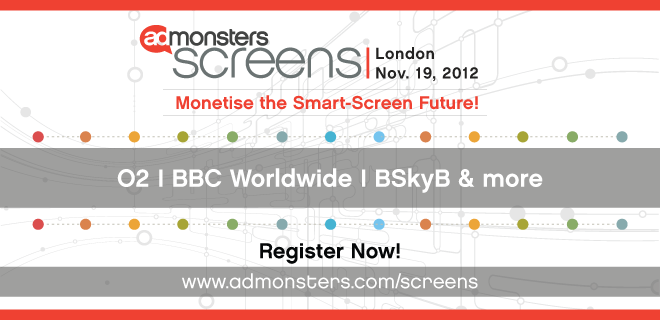
Prior to joining the panel on multiscreen analytics and attribution at AdMonsters Screens on Monday, Nov. 19, Dan Robinson, Artemis Manager at MPG Media Contacts, joins his colleagues in debating “The Attribution Dilemma” alongside representatives from Google, Adobe and others.
Paul Silver, Director & Chief Strategy Officer for ExchangeWire (where Dan just published an intriguing piece on the DoubleClick DFA Attribution Modelling tool) will also make an appearance at Media Contacts’ London offices on the afternoon of Thursday, Nov. 8 to chime in on the modern measurement milieu. Click here for information on RSVPing – if you can’t make it, you can follow the fun on Twitter through the delightful hashtag #lastclickRIP.
We caught up with Dan to get the scoop on “The Attribution Dilemma” – both the event and… well, the actual attribution dilemma – as well as the AdMonsters panel.
Instead of asking why last click needs to die (which almost seems rhetorical at this point), a better question might be, “Why is last click still alive?”
Last click is still alive mainly because it’s what’s always been done and the whole system of online advertising has been built to best optimise to it. It’s easy, everyone understands it and online exchanges and DSPs become very adept at ‘playing’ the system so everybody always appears to be doing an awesome job!
Why should publishers care about attribution? Isn’t it a demand-side issue?
If publishers want to be given the credit they deserve for helping to drive online sales then they should definitely care about attribution. If a user is served some display activity and then visits the site using PPC and converts then surely we shouldn’t just assign all the credit for that conversion to the search engine. Attribution is how we can assign fair credit to each exposure.
At the multiscreen level, attribution gets a mite tricky – can you provide an example of how MPG Media Contacts approaches this dilemma?
This is very much the burning issue within the Attribution sector at the moment. There are some potential solutions available but nobody has really cracked it yet. Some kind of login solution from one of the really high-reach networks with cross-device appeal – I’m talking Google or Facebook here – is the only way that it can really be resolved. Recent moves from Google indicate that they are on the way to offering this.
What factors should be weighed in deciding between attribution methodologies (i.e., fixed, manual or algorithmic)?
This really depends on the kind of data that you have available. Each of these methodologies has its strengths and weaknesses. Fixed attribution models offer the chance to quickly apply a variety of different views of conversion allocation to your online media data, but without providing any indication of which of those views is giving best answer.
Manual models provide one clear view of your online media performance based on a analysis of that data; the issue is that once the model is built, it needs to be refreshed periodically to take account changes to the market, which can be time-consuming. Algorithmic attribution works to build a new model for each reporting period based on the data within that period, so the model is constantly refreshing itself. However, this means that each model is built entirely by algorithm, with no human input.
Beyond what we’ve discussed here, what question or topic is bound to be argued over the most at “The Attribution Dilemma“?
One other issue bound to be discussed is the incorporation of offline media data into Attribution models. We tend to think of Attribution as only relating to online media, but econometric modelling is also a form of attribution. How can we work to join the two together?
 |
The age of multi-screen is upon us. Whether you’re interested in mobile, tablet, IPTV, goggles, or other enabled devices, learn cutting edge techniques and best practices from industry leaders and get involved in discussions with expert panelists only at AdMonsters Screens, Nov. 19 in London. |